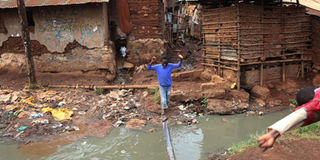Girls’ future doomed without mental healthcare, warn advocates

What you need to know:
- Girls in rural, slum areas face challenges including rape, unsafe abortions, early marriages and FGM
Failure to invest in comprehensive and accessible mental health services dooms future of girls and boys, gender equality advocates have warned.
Speaking during the just ended 9th Africa Conference on Sexual Health and Rights (ACSHR) the campaigners said girls in rural and slum areas grapple with multiple challenges including rape, unsafe abortions, early marriages and female genital mutilation(FGM) destabilising their mental states.
“The trauma raped girls go through is deep,” said Ms Maureen Magak, a Sexual and Reproductive Health and Rights (SRHR) advocate with Young Women’s Christian Association.
“A girl goes to the police and she is told, we are not sure whether you were raped. There is no proof. Rape is unimaginable experience. That kind of a girl needs helps to avoid falling into depression or committing suicide,” she added.
She said schools, churches and rural villages should have facilities that provide mental healthcare services, as they would greatly save the lives of traumatised girls and boys.
HELPLESS AND DEPRESSED
“They (boys and girls) need information on where to get help when they feel helpless and depressed. We need these generation to build our economy and therefore, we must invest in their mental health to secure their future,” she said.
Mr James Namalira, a sociologist and Southern Coordinator for Educate Her, which champions for men’s inclusion in educating girls, said young people commit suicide due to lack of information and safe spaces to speak out.
“Boys and girls do not really understand what reproductive health is all about,” he said.
“When they become adolescents, they engage in various things then they contract STIs (sexually transmitted diseases).Then they are stressed and traumatised ending up committing suicide,” he added.
The 10-14 February conference held at Kenyatta International Convention Centre (KICC) in Nairobi, brought together gender equality advocates, civil society and scholars from at least ten African countries.
They reflected on governments’ efforts towards addressing sexual and reproductive health and rights of women and girls in the slums, as well as proposed solutions to be presented to the respected governments.




